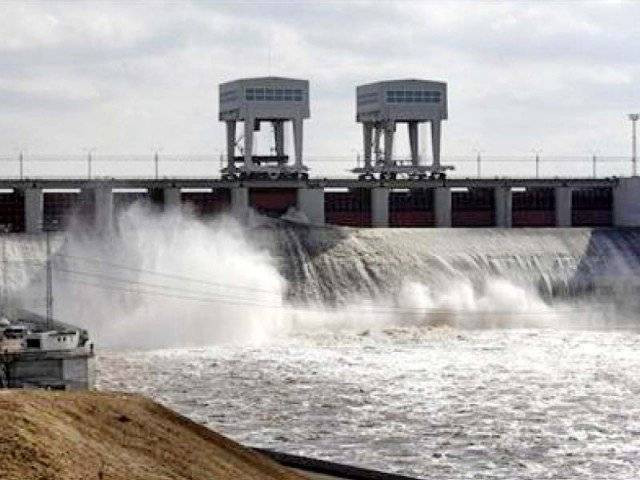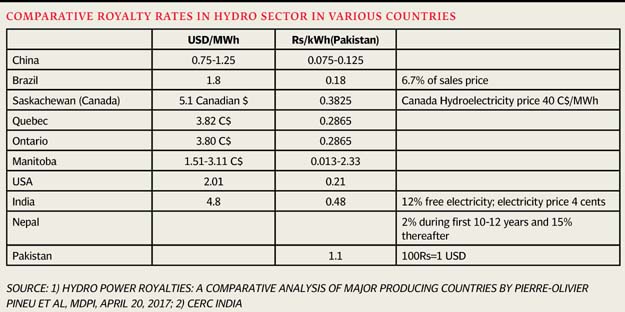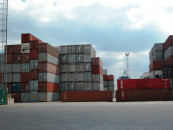Hydro royalty - consensus reached
Hydel electricity has become as expensive as any other resource

PHOTO: REUTERS
Some provincial leaders of Khyber-Pakhtunkhwa (K-P) have issued strong statements on the subject, demanding early resolution of their grievances.
The Council of Common Interests (CCI) has reached a consensus on the issue, which has been passed on to relevant authorities. The Water and Power Development Authority (Wapda) has applied for its tariff to Nepra, containing approved figures and a public hearing has been scheduled for its consideration.
Government plans to add 41,000MW through hydropower by 2030
Nepra has issued some questions as the issues to be considered as a matter of standard practice.
CCI has reached consensus on Rs1.10 per kWh as NHP, settling many issues of payables and receivables. Wapda has been earlier paying Rs0.58 per unit as NHP or royalty.
Actually, the real and internationally recognised term is royalty, which is dealt with in the case of resources such as minerals, oil and gas, etc. The term NHP has created difficulties. It is difficult to define and exactly determine NHP. There could be many interpretations.
One of the interpretations was done by late AGN Kazi, a towering personality of his time in government bureaucracy.
His formula defined NHP as the difference between average cost of electricity production (average wholesale price) and the production cost of hydroelectricity.
Some people argued that instead of average cost of generation (COGE), it should have been the next best rate from which the difference should have been calculated as NHP. AGN Kazi formula created some controversy as it yielded a NHP of Rs1.80 per unit at a time the hydro tariff was Rs0.50 or even less.
Another reason for controversy has been the unduly low COGE of Tarbela due to the depreciated assets having very little or no book value.

A tribunal was constituted which gave its ruling in favour of AGN Kazi formula. One of the tribunal members while signing the tribunal decision also said that let us not kill the goose that lays eggs. The goose (Wapda) has since been protesting and asked the government to foot the bill as it did not have the resources to pay such a high royalty/NHP.
K-P people and politicians should feel happy and satisfied. They have the highest possible award of NHP/royalty if compared with other countries. It is more than twice than that of India and several times higher than in other countries known for internal fairness and equity policies.
Re-examination
There is a need to re-examine the issue on a permanent basis. The current CCI decision, although a welcome one, does not lay down a formula. It is a figure that may be contested later due to inflation and other factors.
Interestingly enough, NHP, as defined by AGN Kazi, renders hydropower as expensive as any other resource for if there is a difference, it would be charged as NHP. Thus, no more slogans of cheap hydropower should have been raised. Hydropower is getting expensive each day.
All new projects are yielding a COGE of Rs8 per unit or even more. Solar and other renewable energy prices are coming down to Rs4-6 per unit. Local gas-based electricity is already available at a COGE of Rs5-6 per unit. Low oil prices have caused reduction in average tariff.
When furnace oil is eliminated from the energy mix and more economic resources come in, the situation may drastically change. There would be no NHP.
But K-P would need revenue and it should continue to get revenue. This indicates a need for reconsideration of the NHP issue to settle it on a more sustainable basis. It does not mean as should be evident from the aforementioned, I must clarify that, I do not mean to oppose the current NHP determination at Rs1.10 per unit. It is a consensus creating decision and it should be welcomed.
Royalty is generally considered a reward to the people and governments of a region or country for their resources are consumed and regional and local environment is usually compromised causing land-use changes, pollution and general disturbance, unpredicted changes in life and power structure, etc.
Many royalty provisions, therefore, require distribution of a share to local people and government. In my opinion, hydro royalty should have been spent on people in social sector and improvements in the areas which have been affected by resource development activities.
When Tarbela was developed, compensation rules were not fair, although, today more than Rs100 billion has been spent on land purchases and acquisitions.
K-P government has instead opted to develop hydro sources from a Hydro Development Fund that has been created to channel royalty income. K-P has grinding poverty and much-needed social sector assistance is required there. K-P has no obligation to generate or provide electricity. It should not divert its much-needed resources to something for which the federal government is responsible.
Water user charges
While NHP is payable by public sector projects to the provincial governments where the project is located, IPPs are required to pay user charges.
Hydro royalty, whether termed NHP or water user charge, ought to be payable irrespective of the ownership being in public or private sector. It is a compensation or user charge whatever term may be adopted.
Currently, IPPs are liable to pay a water user charge which is Rs0.45 per kWh. Up till now, it did not matter as there was no hydropower project in the private sector.
However, in future, many hydropower projects are expected, a number of those are in the pipeline already. It is only fair that the IPPs be required to pay as much as public sector pays.
Royalty payments to AJK
Currently, no royalty is paid for Mangla Dam, which is situated in AJK. There are, supposedly, some political or constitutional implications or impediments to applying NHP provisions to AJK. There can be issues of extraction or levying charges. This is an anomaly that should be removed.
Some Kashmiri nationalists raise it as a negative point against the government of Pakistan. It should be, however, noted that AJK gets payments on many accounts and also there is an almost free electricity regime in AJK.
Royalty for Punjab
Up to now, successive Punjab governments did not want to charge royalty. Perhaps, there was a political stigma to it being an unnecessary extraction. No royalty has been paid on Ghazi Barotha.
The Punjab government has demanded royalty on the lines of K-P and CCI has ascended to their demand. Even back payments are being made.
Therefore, Wapda has included Punjab royalty payments in their tariff application. So now that Punjab is getting hydro royalty, AJK should also get it.
Chinese investors interested in seven K-P power projects
However, there may not be a case for small hydro projects of Punjab to get NHP, as its cost of generation is very high and there is no NHP or profit to be charged on the power producer in that case, although it is a small amount.
Concluding, although consensus has been reached on numbers, it is temporary. There is a need for building a lasting and sustainable solution based on definite definition and methodology on which there should be consensus.
The writer has been member energy at the Planning Commission until recently
Published in The Express Tribune, June 12th, 2017.
Like Business on Facebook, follow @TribuneBiz on Twitter to stay informed and join in the conversation.


















COMMENTS
Comments are moderated and generally will be posted if they are on-topic and not abusive.
For more information, please see our Comments FAQ